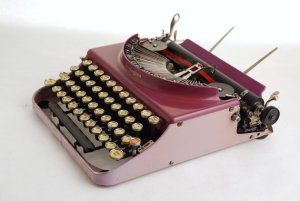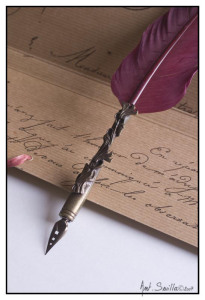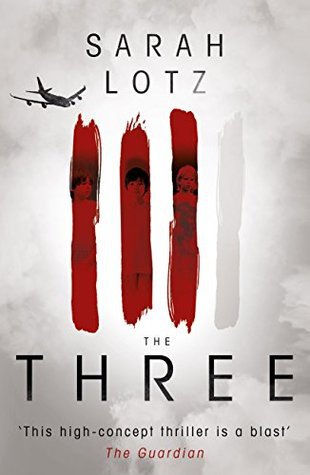I’ve been writing for a number of years now, but it was only recently that I heard the term, “purple prose“. Ever since then, I’ve heard it cop a lot of flak and I didn’t (and still don’t) understand why.
But firstly… what is “purple prose”?
Purple prose is a literary term used to refer to writing that is considered “flowery”, “ornate”, “decadent”, “elaborate” (and other synonyms).
(“Beige prose” falls on the other end of the spectrum, both in nature and in colour.)

But, how exactly does purple prose differ from what is considered normal or plain prose? Is the normal, or acceptable, prose a weird combination of the colours then? If you’re a fan of this beigey-purple taupe prose, then that’s great. I’m totally on board. I love a healthy mix of the two as well. I simply want readers (and authors) to give purple prose a chance. Ask yourself why you dislike it. Is it a matter that you prefer plain prose, or is it the reputation purple prose has earned that is the basis for your utter disdain?
I have been told I write purple prose, and I have taken it as nothing else but a compliment. As a big fan of Romantic or Gothic style literature, I love emotive, descriptive, flowery writing. I have never considered it “over the top”, but a lot of people do. So this is where I cannot help but wonder, why is purple prose bad and where is the line drawn?

In my search for answers, I came across a paper entitled, “In Defense of Purple Prose” — a coincidence, I assure you! — and one particular part stood out to me:
“Certain producers of plain prose have conned the reading public into believing that only in prose plain, humdrum or flat can you articulate the mind of inarticulate ordinary Joe … This minimalist vogue depends on the premise that only an almost invisible style can be sincere, honest, moving, sensitive and so forth, whereas prose that draws attention to itself by being revved up, ample, intense, incandescent or flamboyant turns its back on something almost holy – the human bond with ordinariness” (West).
So, does this mean purple prose isn’t actually bad, but simply has earnt a bad reputation?
I find West’s argument very interesting considering there is a theory that “purple prose” is seen as pretentious, or reserved only for a particular audience, and… is simply “wrong”. I hear more arguments of purple prose being elitist, than arguments of plain prose being lazy. As a reader, I want imagery, I want to be challenged, I want to be stimulated, I want to be immersed into the story, and I want to think, “Holy shit! That is amazing writing!” I want more than just a story. I find novels with purple prose able to tick all these and more.
Writing is one of those mediums where you can do no wrong. There may be some things that will make publishing difficult (James Joyce’s 100-word sentence may not take to a modern reader, and almost certainly wouldn’t be published today), or may turn readers off (change of tense/change of P.O.V.), but really, writing is flexible. Novels should have no formulae, especially not in how the prose is written. The most common piece of advice I hear is:
Write what you like.
And… you will find others that like it too.
To simply say that purple prose is “wrong” is kind of narrow-minded, in my opinion. And to completely dismiss a work because of purple prose is unfair. The most wonderful thing about purple prose is that anything can be made beautiful. I’m sure there is a writer out there that can even make doing one’s taxes sound exotic.
The problem is that all forms of purple prose are lumped together, whether they be good, bad, or ugly.
I have no qualm with minimalist writing. It is not my personal preference, but I won’t turn a book down because of it. I am currently reading a novel however that is very minimalist, so much so that there have been times where I couldn’t pin point where the characters were. “Floating heads” is the term, I believe (and I have certainly been guilty of that!). Anyway, this novel, which I won’t name, is really pushing me. I don’t usually give up on a novel, but I’m heading there. As I said, I’m fine with minimalist writing, but I feel like I need to be compensated in some way, for the loss of purple prose. I need a damn good story and plot! And no floating heads!
I need more beigey-purple taupe prose at the very least.
So, are the works of the 19th century, the Romantic/Gothic literary style, dead? Are modern readers more interested in plain prose or minimalist writing?
I do believe that perhaps the addition of purple prose could have saved some of E.L. James’ descriptive writing. I know she is considered a “God” to some of you, but could you please put your pitchforks down for a minute? James certainly opened up the erotic fiction genre (although I do have some qualms with her methods), absolutely, but it would be great if we could at least agree on one thing: her writing is pretty poor.
“Now I know what all the fuss is about. Two orgasms – coming apart at the seams, like the spin cycle on a washing machine, wow.”
This is probably one of the most famous “bad” (or “funny”, depending on your perspective) lines of 50 Shades of Grey. This kind of descriptive writing is typical of “beige prose”, and could be saved with some purple. The writer should be more attentive to descriptive language so the reader can visualise everything. The use of “washing machine” is also very “beige”. It is boring, it is mechanical, it is cold. Some more decorative language could win me over.
West continues with a question that I think is truly valid,
“How many prose writers can you identify from their style?”
Just like you can pick up a Smashing Pumpkins song from their style, or a fashion designer, so too should you be able to pick up an author from their style of writing, at least I believe so. When I’m reading Marie Corelli or Lilith Saintcrow, I know I’m reading them. Lilith Saintcrow may be upset that I call her writing purple prose, as many authors find it a terrible thing, but I consider hers to be the definition, or my definition of “purple prose”. The A Tale of Beauty and Madness series is a great example.



If not “purple”, then definitely a shade darker from the “beigey-purple taupe”. Corelli and Saintcrow have a very unique style and that’s why I keep coming back to them. Well, not Marie Corelli as she is quite dead, unfortunately. But the book I’m reading now? Anyone could have written it, in my opinion. There is no unique style. And that book is what I would label “beige” or plain prose.
What is your definition of “purple prose”? Where is the line drawn, do you think? Which authors do you consider “purple” and which do you consider “beige”?
What are your thoughts?
Let me know in the comment section below.
I recently came across an argument regarding the use of purple prose. It was said that purple prose is essentially the reader describing the story as if it were a movie. Every minute detail, dramatic action, and so on described. That is certainly an interesting point. I agree that being overly descriptive (ie giving too much unnecessary information) can be an issue, but I see a distinction between that and emotive, flowery writing. I would also like to argue that, to me, it is the minimalist writing or “beige” prose that comes across more as a film or transcript. This, of course, is not meant to be a generalisation. I am speaking from my experience as a reader. I have read novels that have been absent of action, emotive and descriptive writing altogether. It reads like a transcript because it is simply dialogue. (Dialogue-heavy books aren’t my thing, keep in mind.) But I like the idea of a book being so detailed that I can picture it with ease. They say that books are better than their film counterparts. If it is merely dialogue, I can take the film at face value, and I don’t like that.
I like my writing. Not everyone will, I know that. I also know that I can go over the top, but I do my best to rein it in. That doesn’t mean I will give up purple prose to do that though.
It is difficult finding modern books that I love. I essentially want Romantic/Gothic works, complete with 19th-century language and style. There are only so many novels out there that meet my needs. I hate to be so fussy, but I’m running out of Brontë, Corelli, Le Fanu, Radcliffe, and others. If they weren’t so dead, that would be fine, then I could bug them relentlessly.
I’ve bought a lot of anthologies, such as The Mammoth Book of Ghost Stories by Women, in the hopes of getting a taste of what I’ve been craving for years. And I do find some, but I want more!
So please, writers out there, I implore you. Give purple prose another chance. I’ll love you for it ❤

Give me beautiful, give me sublime. Give me purple prose!
Know an author I’ll love? Are you one of them? Let me know in the comment section or send me a message. I want to read your works!
West, Paul. “In Defense of Purple Prose.” The New York Times. 15 Dec. 1985. Accessed 11 March 2017.
Image credits: NeOld and blogylana Advertisements Love it? Share it:
- More






